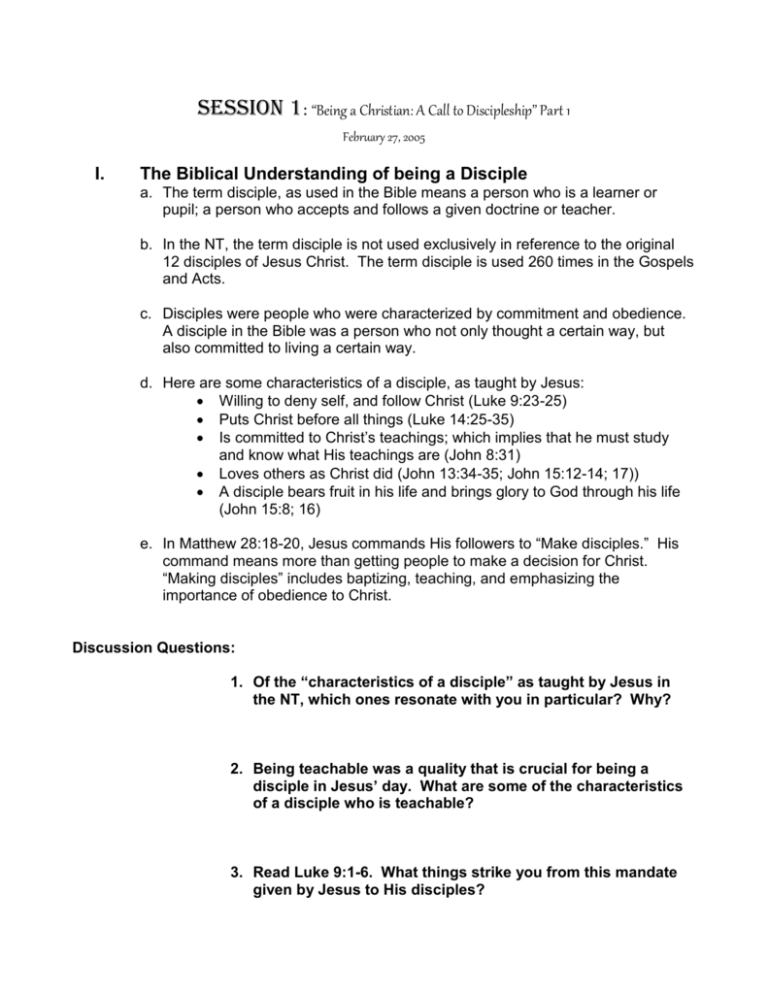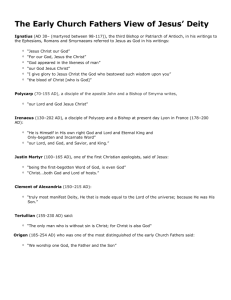Discipleship_1 - Wintersburg Presbyterian Church
advertisement

Session 1: “Being a Christian: A Call to Discipleship” Part 1 February 27, 2005 I. The Biblical Understanding of being a Disciple a. The term disciple, as used in the Bible means a person who is a learner or pupil; a person who accepts and follows a given doctrine or teacher. b. In the NT, the term disciple is not used exclusively in reference to the original 12 disciples of Jesus Christ. The term disciple is used 260 times in the Gospels and Acts. c. Disciples were people who were characterized by commitment and obedience. A disciple in the Bible was a person who not only thought a certain way, but also committed to living a certain way. d. Here are some characteristics of a disciple, as taught by Jesus: Willing to deny self, and follow Christ (Luke 9:23-25) Puts Christ before all things (Luke 14:25-35) Is committed to Christ’s teachings; which implies that he must study and know what His teachings are (John 8:31) Loves others as Christ did (John 13:34-35; John 15:12-14; 17)) A disciple bears fruit in his life and brings glory to God through his life (John 15:8; 16) e. In Matthew 28:18-20, Jesus commands His followers to “Make disciples.” His command means more than getting people to make a decision for Christ. “Making disciples” includes baptizing, teaching, and emphasizing the importance of obedience to Christ. Discussion Questions: 1. Of the “characteristics of a disciple” as taught by Jesus in the NT, which ones resonate with you in particular? Why? 2. Being teachable was a quality that is crucial for being a disciple in Jesus’ day. What are some of the characteristics of a disciple who is teachable? 3. Read Luke 9:1-6. What things strike you from this mandate given by Jesus to His disciples? II. Being a disciple today a. Where it begins In order to become a disciple of Jesus Christ, one must first be reconciled to God through faith in Jesus Christ (be born again). This point is illustrated graphically in Christ’s exchange with Nicodemus in John 3. What might this look like? It is to respond in faith to the Gospel of Jesus Christ. Such a response might look something like this: 1. Realization that there is a Divine, Almighty, Holy, Sovereign Creator who sets the standard for righteousness, which is absolute perfection (Genesis 1:1; Isaiah 6:3; Psalm 5:4-6; Matthew 5:48). 2. Realize that none of us have successfully led a perfect, sinless life (Romans 3:10, 23). Because we have not led a sinless life, all of humanity is subject to its consequence: death physically and eternal separation from God and His Kingdom. 3. Realize that into this hopeless situation, God in His mercy, sent His own Son, Jesus Christ into the world. Jesus, unlike all other humans before Him, led a perfect life. He was the only human to meet God’s standard of righteousness. Jesus then chose to receive the punishment deserved for all of humanity, in his death on the cross. He died in our place. However, Jesus overcame the power and consequence of sin and defeated death itself by rising from the dead. It is only through Jesus Christ that we can be restored to a right relationship with God, and enjoy eternal life with Him (Romans 5:8; John 3:16; John 14:6). 4. Realize that therefore, we must turn from our dependence on self or things, and instead turn to God through faith in Jesus Christ alone. We must put our trust in the finished work of Jesus Christ on the cross and His resurrection, to be reconciled to the Holy, Just, Gracious, Almighty, and Loving God, and receive the gift of salvation and eternal life with Him (Ephesians 2:8-9; Romans 6:23). 5. Such a response in prayer to our Heavenly Father might look something like this: “Heavenly Father, I confess from my heart that I do not meet, nor can I ever meet your standard of righteousness. I am a sinful person. I know that there is nothing I can ever do to make myself good enough. I believe that you sent your Son Jesus Christ to die on my behalf, to receive the punishment that I deserved. I believe that Jesus died and rose again. Therefore, I place my trust in the finished work of Jesus Christ alone for my salvation and receive the gift of eternal life.” The Bible clearly teaches that reconciliation with God is through repentance and faith in Jesus Christ alone (Ephesians 2:8-9). Therefore, we must be careful not to put confidence in any other thing; i.e. church attendance, service, giving, “great” acts of goodness and selflessness. Furthermore, there are no “grandfather clauses” in terms of entrance into the Kingdom of God; i.e. one does not get an automatic place because his or her father/mother was a faithful believer. Each person is responsible for making this commitment of repentance and faith. Discussion Questions: 1. The Gospel is often called “The Good News of Jesus Christ”. Why is it Good News to you? 2. What is the basis of your relationship with God? Your answer to this question is crucial. Please take a moment or two to truly reflect on this. Please make certain that it is not based on any good work you have done.








